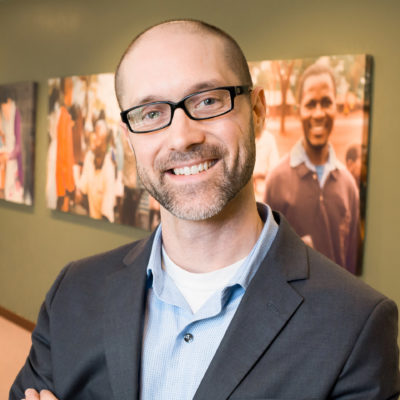
Youth Ministry Curriculum. How Do I Choose?
I remember walking into my first year of teaching. I didn't really know how to teach from a curriculum, how to develop curriculum or even what a curriculum map looked like. I spent the first year pretending to know terms like scope and sequence, differentiated instruction, and Blooms Taxonomy. But what I did know was that something needed to change. The status quo was in no way challenging the students' in their walk with Christ, and they begged to go deeper. So I began to make some changes. What I hoped would merely be a year long process—changing curriculum as I taught—took almost five years. And I loved every minute of it. Even after the first five years, I continued to develop, change, consult, and change again. I was always trying to make my content and methods the best it can be.
But the reality is, is that most of you are not like me.
From my experience, pastors and teachers tend to fall into one of three groups. A relatively small number of youth leaders love to create. Like me, they work relentlessly to craft curriculum, messages, and sometimes the whole youth group experience. Then there are those who take existing curriculum, mold it, and shape it to their group and context. These are often the experienced, educated youth leaders who just don’t have the desire or time to create (even if they did have the desire) unique curriculum for their group. Lastly, are the majority of youth pastors and leaders who just want something to plug in and play; something well designed so that you can focus on pastoring. Whether full-time, part-time, paid or volunteer, I know that many of you are searching for a curriculum that fits your needs. A program that is biblical, challenging, and comprehensive—one that can be molded or modified, or just used as directed.
I recently did a quick Google search on youth ministry curriculum. Google returned over 3 million results. Now I recognize that many of those are irrelevant results, but it does shed some light on just how difficult it can be to narrow your search down enough to make an informed decision.
But with so many choices, how do you choose.
There is plenty of good advice out there. I’ll even admit that there is plenty of quality curriculum being developed. But there are two absolute non-negotiable in every curriculum that if you miss, you will no doubt waste your money, your time, and your students’ time. Leaving them wanting and spiritually dry.
Keep The End Game in Mind.
Ask yourself, what do you want your students to know when they graduate. I used to think of students as they walked across the stage at graduation. I thought about what they needed to know going on to the next level. What would prepare them for college, academically and spiritually? And then work backward. You can’t teach them everything, so you have to prioritize. Educators call this a scope and sequence. It is deciding what concepts students need to be introduced to, what areas they need to develop and
review, and which concepts they should master. But it also addresses when. It helps you map out year over year when students will be introduced to specific concepts, how are they expanded on and developed? Think of it like learning math. You can't understand calculus until you master algebra.
What makes curriculum maps and scope and sequence tools so essential is that it helps you stay on task, stay focused, navigate the rough waters they come, and helps you to evaluate how your students are doing in head and heart. Overall all of us want students to understand the whole of what it means to follow Jesus and embrace the life of a disciple. That might mean some introduction to some deeper theology, or some mastery of evangelism. It will require some knowledge of how to engage culture, as well as learning spiritual disciplines. This is often going to look different for your freshman than it does for your seniors. So you need something that helps you navigate varying levels of learning in a single lesson. Never assume all your students (even in the same grade) are on the same level academically or spiritually.
So as you look at your options and dream of the ideal students graduating from your ministry, find an experienced teacher in your congregation or at a local Christian school and share with them your typical student at graduation and what your goals are for your students. Ask them to help you either analyze a current scope and sequence or create your own and then find the curriculum that best fulfills those needs and goals. Know your end game and work backward from there.
The Thing is Not The Thing
When creating curriculum at Awana, we are constantly reminding ourselves that the thing is really not the thing. Meaning that although our content is thoroughly biblical, Spirit-driven, set up with multiple learning styles in mind; underneath the surface we are actually teaching students to think on their own. In other words, the curriculum although packed with content serves as a tool for students to become independent thinkers.
A well-crafted curriculum never just tells you how to teach or what students ought to think. Instead, it serves as a guide with multiple tools to be used. Students should never be told what to think, but how to think. Our job, as leaders, it to guide and facilitate the process. Excellent curriculum creates spaces for students to freely think, get it wrong, argue their point, but finishing each lesson properly equipped with the truth. Make sure students have time and space to ask questions, do their own research, and draft some conclusions. Don't sweat it, if they are wrong. Guide them to what is right. Good curriculum is like a well-stocked toolbox. We help them with the foundation, and they will know how to build the rest of the house.
If you want to see what a curriculum created using these two guiding ideals looks like, download a free lesson of Journey (for high school) or Trek (for middle school). The entire Trek and Journey programs are created with the graduate in mind; what we want them to know, how we want them to behave, the truth we want them to love out, and the tools they need for the road.
Steve Kozak
Executive Director of AwanaYM
Steve currently serves as the Executive Director of AwanaYM. Previously, Steve spent over a decade teaching high school theology and apologetics from Detroit to LA. Steve holds a Masters degree in Theology from Moody Theological Seminary and a Masters in Christian Apologetics from Biola University. Steve is also an adjunct professor at Trinity International University. He speaks and writes on youth ministry, youth culture and apologetics. He resides in Chicago, IL with his wife and four children.FollowSteve Kozak on Twitter: stevenmkozak
Comments
Get the AwanaYM Update
Receive youth ministry resources in your inbox. Subscribe today!
